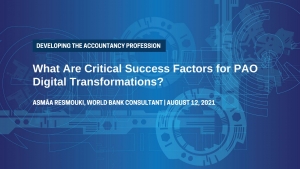عرض العناصر حسب علامة : التحول الرقمي
الأربعاء, 13 أكتوبر 2021 20:09
4 تغييرات ستستمر في المحاسبة لفترة طويلة بعد انتهاء الوباء
لقد أثرت التأثيرات بعيدة المدى لوباء COVID-19 على كل صناعة في جميع أنحاء العالم، ولم يعد خبراء حماية البيئة محصنين.
معلومات إضافية
-
المحتوى بالإنجليزية
4 changes that will stick with accounting long after the pandemic is over
By Justin Hatch
October 12, 2021 3:24 PM
Facebook
Twitter
LinkedIn
Email
Show more sharing options
The COVID-19 pandemic’s far-reaching effects have touched every industry around the world, and CPAs are not immune. Not only were CPA firms working to help the businesses they serve survive economic challenges, but they were fighting their own battles as well. According to one survey, approximately 90% of CPA firms reported concerns for their company, ranging from health to finances and operations. Despite the challenges, firms also reported facing the challenges with innovations like using cloud technology and innovation.
Necessity is the mother of invention — or in some cases, reinvention. The accounting industry was forced by COVID-19 to evolve almost overnight, and not all of the changes that occurred will be going away. Here are some of the adaptations that will be part of the industry going forward.
Adaptability
coronavirus-mask.jpgCPAs have learned to adapt quickly to changes in their work, whether it be major financial programs like the Paycheck Protection Program or adjusting the way they work with clients. Clients have come to expect continually up-to-date information from their CPA anytime they need it, and there will be no going back. Customers will expect their accountants to be able to come up with solutions at the drop of a hat, whether or not there is an international crisis.
Not only will customers continue to demand more agility from CPAs, but there will always be rapid changes that require accountants to think on their feet. CPAs stood tall when the challenge arose in 2020, and the pandemic only made them more able to face any new obstacles in the future.
Better communication
A lack of in-person interaction could be detrimental for some, but for CPAs, it may have actually been a boon. Trying to work remotely with clients forced CPAs to communicate more effectively. Cloud-based dashboards, video conference calls, chatting online, and sending frequent emails are the norm now, whereas both CPAs and clients may have been reluctant to give them a try before.
Clients couldn’t be left hanging during a pandemic that had major financial implications. They needed fast, insightful information about new programs and how they could help their business, and it was up to CPAs to stay on top of it all and boil it down for them. The result is CPAs who are better communicators for future clients as well.
Flexible work environment
COVID-19 brought about a sudden adjustment as workers moved from conference rooms to living rooms. Though many businesses, including CPA firms, later began bringing workers back, the office landscape has likely changed for good. More workers are staying in their home offices full time or choosing a hybrid option, with some working from home and some in the office. This shift not only affects the way a CPA firm runs internally but also how it will serve its clients — many of whom are shifting to more remote work as well.
CPAs and clients alike learned to work with each other from a distance, and that will add a level of flexibility going forward that will benefit everyone. Businesses will come to rely on their accountants outside of more traditional meetings and scheduled reports, and CPAs will be able to answer the bell from anywhere if needed.
Expanded services
The Paycheck Protection Program was a much-needed life preserver for struggling businesses in 2020, but the intricacies of the program were a lot to work through. Applications, required paperwork, loan forgiveness and other factors could make the program confusing for business owners. CPA firms reported expanding services to help businesses take advantage of the program, making up 39% of new services offered to clients.
Although this service was directly related to the pandemic, firms will continue to expand their offerings even after the pandemic is in the past. In a 2021 survey, 33% of firms reported they anticipated adding new services like financial advisory, cash flow and risk advisory in the next year.
Many of the changes brought on by COVID-19 were already in motion in the industry, but firms got the extra push they needed to move forward. Businesses have been seeking more advisory services from their CPAs for years, and many firms have begun to expand their offerings. The pandemic, and the severe economic impact it had across industries, helped move the transition along.
CPAs have fought alongside their clients through the COVID-19 pandemic, and their work has been vital to businesses’ success through the crisis. The lessons learned from the pandemic will have a long-lasting impact on the profession as CPAs continue to adapt and grow for the benefit of their clients.
نشر في
موضوعات متنوعة
موسومة تحت
الثلاثاء, 14 سبتمبر 2021 20:53
اظهر بأفضل ما لديك خلال الدروس عبر الإنترنت
معلومات إضافية
-
المحتوى بالإنجليزية
November 10, 2020
Help students succeed with online testing
October 13, 2020
Variety is the spice of online learning
TOPICS
Accounting Education
Professional Development
Well-Being
The new semester offers a chance to start afresh, and one way to do so is by improving the way you look online, enhancing your reputation as a faculty member who can deftly navigate the digital world.
Here are a few simple tweaks that can help you appear at your best during online classes:
Choose the setting. When it comes to online classes, your appearance starts with where you’re sitting, so consider the background part of your image. Select a quiet area free of background noise and people coming and going, and think carefully about what people can see behind you, said Michael Freeby, a celebrity photographer and videographer. Instead of showcasing something potentially distracting or controversial, opt for a colorful painted wall or wallpaper. “Choose whatever backdrop you feel fits the image of yourself you would like to promote,” he said. If your university or department has a specific logo, you could custom-create a virtual background with the branding or logo as the backdrop, he suggested.
Make sure that your background doesn’t draw too much attention. “Uncluttered backgrounds allow students to focus,” said Scott Dell, CPA, DBA, an assistant professor of accounting at Francis Marion University in Florence, S.C.
Focus on lighting. Evaluate the lighting in the room where you’ll be on screen so that you don’t appear too light or dark, and use natural light to your advantage. “You don’t want any room with lighting that has orangey or yellow tones, and you also don’t want dim lighting as it will look significantly dimmer on camera,” Freeby said. While positioning yourself near windows with natural lighting generally works well, be “sure the light doesn’t shine directly into your eyes, making you squint,” advised Parker Geiger, chief executive of the Personal Branding Center, a professional coaching and consulting business based in Atlanta.
If your location has strong lighting or sunlight streaming in from behind “you can try to counteract that by setting your screen brightness really high to put more light on your face,” said Abir Syed, CPA (Canada), a Montreal-based e-commerce consultant with accounting services site UpCounting.
When appearing on camera, having lights in front of you is helpful. That’s why many people put a lamp in front of the laptop or buy a ring light, which can range from affordable to pricey and can stand alone or be attached to the computer or laptop, Freeby said.
Pay attention to your camera angle. The placement of the camera can also affect how you appear. Have the “camera at eye level,” Dell said. “People really don’t want to look up at you.”
For this reason, “make sure the camera hits you either at a completely parallel level to you, or from above you,” Freeby said. “Looking down to the camera is never a flattering angle, especially for video.”
Geiger suggested thinking of the screen as the face of your students. If you are using an external webcam, have the video call displayed on the monitor directly under your camera so that it appears that you’re looking at the participants instead of to the side, Syed said. “Having the camera close to the screen is ideal,” as it’ll appear to your students as though you’re looking at them, he said.
Consider your appearance. Even though your students may be in athleisure, be sure to “dress as if you were going to be face-to-face with others,” Geiger said. “Do not just dress professionally above the waistline and wear shorts and no shoes below.” Even if others will only see you from the waist up, how you’re dressed will affect how you feel and present yourself. “When fully dressed, you will project a confident, credible professional presence.” he said.
When it comes to clothing, avoid patterns, which can be “too much for the camera and can be distracting to the message,” Geiger said. Look for colors that complement your hair color and skin tone so that you can appear more striking on screen. Men should have shaved at least an hour before appearing on camera. “You do not want fresh cuts or irritation to show,” Geiger said. “Give the skin a chance to calm down.”
Try to “avoid glasses as they'll create glare and show what's on your screen,” Syed suggested.
Ultimately, Dell said, the key to looking better online is experie
نشر في
موضوعات متنوعة
الإثنين, 13 سبتمبر 2021 20:22
3 مفاتيح تقنية لتمكين المحاسبين
معلومات إضافية
-
المحتوى بالإنجليزية
3 tech keys for empowering accountants
By Clayton Weir
September 10, 2021 10:43 AM
Facebook
Twitter
LinkedIn
Email
Show more sharing options
Much like every business vertical, accounting has seen its fair share of disruption as a result of the COVID-19 pandemic. And although digital transformation efforts have pushed innovation forward in many industries, accountants, by and large, unfortunately have to deal with fractured processes and outdated tools from pre-pandemic times. Not only do accountants have to tackle daily tasks with antiquated technology, but they have to find ways to make this tech meet the modern demands of today’s financial industry. And as the world around them continues to evolve and modernize, accountants are understandably struggling to keep up.
With that in mind, it is time for banks to allocate more attention and resources toward revamping their accounting infrastructure. Here are a few areas in particular that they need to focus on in order to make this happen.
Cloud migration
technology-and-telecom.jpgWith the number of tools that accountants are forced to deal with on a daily basis, remote work is a nightmare for those who are still forced to work with on-premise infrastructure. Moreover, given a significant portion of the financial industry still relies heavily on this “traditional” technology, on-premise is one of the foremost hurdles that is holding accountants back today. That said, the fix is quite simple: adopt the cloud.
By leveraging a cloud-based infrastructure, businesses can immediately boost the efficiency of their accounting teams by giving them easy, instant access to the data and solutions they need from anywhere. Additionally, it can also make onboarding new tools and processes far less painstaking than doing so with on-premise legacy systems.
Embrace automation
With CFOs and accounting teams now expected to participate more fully in business strategy and other non-finance tasks, the amount of time these teams have to engage in manual tasks continues to shrink. And as such, calls for greater automation within finance departments continue to grow.
According to a guide produced by Sage, 93% of finance workers say they would be happy to have tech do their daily accounting tasks. In addition, as budgets remain tight and workforces are continuously expected to do more with less, empowering accounting teams with automation will be pivotal to business efficiency and overall success.
Choose fintechs wisely
No two finance departments are exactly the same. So it is imperative that businesses take a step back and consider their needs properly before adopting tools and processes. Sure, a tool might seem to make sense on the surface, but what if it actually complicates things or makes tasks more challenging? All too often businesses jump into the fintech pool without fully understanding what their needs are and what they need to solve them.
Accountants have incredibly full plates to begin with. And without the support infrastructure and tools they need to juggle these tasks, it is virtually impossible for them to keep up with modern demands. Therefore, businesses need to work in close consultation with finance teams to identify their most pressing needs and find the solutions that are best tailored to them. Granted, with a global remote workforce, this may seem like a daunting prospect. By getting all of their ducks in a row early, not only will businesses be able to make the onboarding process far easier for their accounting teams, but they will also save valuable time and money down the road.
Accountants are integral to helping businesses achieve financial success. And with that, the time has come for these teams to be supplied with the modern tools that their work deserves. Without it, accountants will continue to struggle to meet their full potential and will not be able to help businesses achieve the growth they are looking for.
نشر في
تكنولوجيا المعلومات
الثلاثاء, 07 سبتمبر 2021 11:17
أهم 10 تنبؤات تقنية لعام 2021
أحدث العام الماضي تغييرات كبيرة في كيفية تعامل شركات المحاسبة وعملائها مع التحول الرقمي والتجاري، ولكن السؤال الكبير هو، "ما هي استراتيجيتنا للمضي قدمًا؟"
معلومات إضافية
-
المحتوى بالإنجليزية
1. The pipe gets bigger
business-and-it.jpg
alphaspirit - Fotolia
Bandwidth speeds will increase, and prices decrease, resulting in a continually improving virtual experience.
2. Getting more at home in Zoom
online-zoom-meeting.jpg
Ģirts Raģelis/Girts - stock.adobe.com
Virtual meetings will continue to be popular. Firms will formalize their processes and agendas, creating a better client experience.
3. Opportunities in blockchain and crypto
Bitcoin
Picasa/3dsculptor - Fotolia
Blockchain and crypto will grow exponentially, increasing consulting, financial reporting and tax compliance opportunities.
4. Efficient and effective
RPA robotic process automation dial
Olivier Le Moal/Olivier Le Moal - stock.adobe.com
Automation and continuous process improvement will lead to competitive advantages for firms that are innovative and focused beyond optimization.
5. Hearing from IT and marketing
Joining hands in a circle art
Konstantin Postumitenko/Prostock-studio - stock.adobe.com
Technology and marketing get seats at the table, and must lead at a higher level and produce agile results. Technology and marketing must co-elevate to reach their potential.
6. From vendor to partner
partnership-image.jpgVendor relationships are strategic and must be managed from a strategic rather than a transactional perspective.
7. Spatial technologies
Spatial technologies will augment physical spaces and relationships.
8. 2+2=5
Technology gap
Sergio Donà/itestro - stock.adobe.com
Emerging technology will accelerate and enable innovative firms through a convergence of multiple technologies (e.g., robotics, machine learning and process improvement).
9. Data everywhere
data-small.jpg
Nikita Gonin/ninog - Fotolia
Business intelligence and data analytics continue to grow in importance to all service lines. Data is an asset.
10. Know where you're going
p19j2j3ns58kr1b4v1ti41np21dm98.jpgA vision, strategic plan and IT roadmap are essential, along with an innovative process.
نشر في
تكنولوجيا المعلومات
موسومة تحت
الإثنين, 16 أغسطس 2021 14:55
ما هي عوامل النجاح الحاسمة للتحولات الرقمية لمنظمات المحاسبة المهنية؟
تقدم أسماء الرسموقي مستشار البنك الدولي 5 ركائز أساسية يجب أن تضعها منظمات المحاسبة المهنية لإحراز تقدم ناجح في التحول الرقمي.
معلومات إضافية
-
المحتوى بالإنجليزية
What Are Critical Success Factors for PAO Digital Transformations?
ASMÂA RESMOUKI, WORLD BANK CONSULTANT | AUGUST 12, 2021
There is a significant opportunity for Professional Accountancy Organizations (PAOs) to accelerate digital transformation to improve the delivery of their mandate. This was evident through a recent World Bank project that engaged with Board members and senior management of 20 PAOs in Sub-Saharan Africa, Middle East & North Africa (MENA), Latin America, and the Caribbean regions regarding their digital transformation journeys.
“We need to accelerate adoption of digital transformation to enhance services to our members and public”
“We need to design a digital transformation strategy supported by financial and human resources to leapfrog our service offering during the COVID 19 period”
“Digital transformation will assist us to support prospective accountants in rural areas”.
These were some of the sentiments that were expressed by Board members, and by speakers and participants during the knowledge event hosted by IFAC and the World Bank on PAO digital transformation (available in English and French).
Based on the conversations, the following are 5 key pillars that PAOs should put in place to successfully progress their digital transformation.
1. Governance: Tone at the top should set direction
Throughout the project, it was noticeable that when the PAO President and Board members had a clear vision and were committed to the digital transformation reform, there was commendable and concrete progress. The opposite was also true: i.e., minimal digital transformation among PAOs where leadership did not show enough enthusiasm for the reform or consider it a priority. Therefore, it is important for the Board to take the leading role in setting direction and really driving the necessary changes.
2. Design and implement a user-centric digital transformation strategy
Digital transformation requires a clearly articulated strategy that defines strategic objectives, implementation plans, and performance targets with timelines (Key Performance Indicators).
When designing the strategy, the Board should engage with the membership and all relevant stakeholders to ensure their needs and expectations are incorporated. The final strategy should then be shared and communicated with them. Subsequently, the PAO leadership should regularly request feedback from members and stakeholders on any new digital tools and request suggestions to improve the user-experience. This would create a virtuous circle between the PAO and its stakeholders.
Ideally, the digital strategy should be linked to the overall strategy of the PAO, since digitalization serves as a tool to execute the overall strategy. The Ordre National des Experts Comptables et des Comptables Agréés du Burkina Faso is a good example of a small PAO which has designed its digital transformation strategy using guidance from IFAC’s Information and Communications Technology (ICT) Guide.
3. Be connected and benefit from the country digital economy eco-system
PAOs should be aware of digital transformation reforms in their country and maintain close working relationships with the governmental departments and officials driving the reform. Government reforms seem to be focused on strengthening national infrastructure to improve access and reduce cost, enhancing digital skills, offering digital public and business platforms to accelerate the use of e-services, and strengthening digital enablers like cybersecurity and data protection. These initiatives can have a direct impact on PAOs’ digitalizlation initiatives.
Therefore, it is crucial for PAOs to follow and engage with the right stakeholders regarding national digital transformation reforms to determine they can benefit from such a reform and related activities. This could include empowering their members with greater digital skills by including technology skills in the accounting qualification curriculum and offering regular digital courses in the CPD program.
4. Adequate human and financial resources
Without dedicated human and financial resources, it is a challenge to implement a successful digital transformation reform. This does not necessarily mean having massive and seemingly unlimited resources. It means making smart investments now for better returns and savings in the future. Therefore, PAOs might need to be creative in securing the financial and human resources required to implement their digital transformation strategy.
Securing funding could mean re-prioritizing the available budget to focus on digitalization activities which will add value to members and save costs in future, requesting members to contribute to a special fund for the reform, securing sponsorship, and/or applying for government funding or donor funding, etc.
For example, the Ordre des Experts-Comptables de Côte d’Ivoire partnered with the national tax authority to support taxpayers in filing their financial statements on an online platform. Whenever a member does an online filing, a specific fee is submitted to the PAO, in turn, creating a new alternative revenue stream.
Human resources are also essential. Depending on the financial resources available, PAOs could either designate someone from their secretariat to lead the initiative, engage a consultant, outsource the function or set up a special Digital Transformation Committee with a clear terms of reference.
5. Partnering with others
PAOs should explore partnerships and leverage their IFAC membership and IFAC’s Network Partners. Such partnerships would enable them to benefit from global and regional resources and knowledge-sharing opportunities.
Similarly, PAOs should partner with other PAOs, especially those who have progressed with digitalization reforms already. Such PAOs can serve as mentors: sharing experiences on how they have walked the transformation journey, provide advice and guidance on when and where to purchase new softwares or technologies, and/or provide input to a PAO that is developing its digital strategy, etc. PAOs are encouraged to raise their hands and seek help and support whenever needed.
In closing, while the level of progress varies from PAO to PAO, the challenges for smaller PAOs oftentimes remain greater given their limited resources. Yet, “small streams make big rivers” — starting with small actions and building on them with regularity and consistency should allow PAOs to be successful in achieving their digital transformation goals. All PAOs are invited to consider the above pillars to start or accelerate their digital transformation to efficiently and effectively deliver on their mandates.
نشر في
تكنولوجيا المعلومات
الثلاثاء, 13 يوليو 2021 12:43
ندوة ويب: كيف يمكن لشركات الخدمات المهنية تحقيق سرعة المبيعات؟
معلومات إضافية
- البلد عالمي
- نوع الفعالية مجانا
- بداية الفعالية الأربعاء, 14 يوليو 2021
- نهاية الفعالية الأربعاء, 14 يوليو 2021
- التخصص محاسبة ومراجعة
- مكان الفعالية أونلاين
نشر في
فعاليات مهنية
موسومة تحت
الخميس, 08 يوليو 2021 13:15
التحول الرقمي أمرًا لا بد منه في مرحلة ما بعد الجائحة
معلومات إضافية
-
المحتوى بالإنجليزية
digital transformation is a post-pandemic must
The massive remote work experiment forced upon business by the pandemic has been largely successful for two reasons — the perseverance and diligence of employees and the virtual technologies used to communicate, collaborate and automate business processes.
In the finance and accounting (F&A) function, work tools like video conferencing platforms and automated software solutions allowed for work to proceed — invoices were sent, bills were collected, revenues and expenses were recorded, and companies closed the books. This information served a crucial purpose, enabling more insightful CFO decisions, and the ability to rapidly respond to unpredictable market changes.
With the pandemic receding as the public gets vaccinated, many CFOs are heeding the lessons learned over the past 14 months and doubling down on business process automation. While this digital transformation was underway pre-COVID-19, the impact of the pandemic on how people work has accelerated CFO investments in technologies that allow F&A teams to virtually access data across enterprise systems, enhance efficiencies, optimize cash management, reduce costs, and provide clearer visibility into business performance for decision-making.
ASC 842 and IFRS 16 Lease Accounting Software from CoStar
Lease accounting software from CoStar analyzes and classifies leases for new lease accounting requirements
PARTNER INSIGHTS
SPONSOR CONTENT FROM COSTAR
The findings of three recent surveys suggest renewed CFO urgency surrounding digital transformation, with investments geared to helping the F&A function thrive in today’s “new normal” of work. Deloitte’s Q1 2021 CFO Signals, for example, indicates that more than three-quarters of CFO respondents expect more of their finance and accounting work to be completed remotely post-pandemic. Nearly two-thirds (63%) plan to make technology investments that improve FP&A (financial planning and analysis), management reporting (46%) and controllership/accounting (25%).
A survey by Gartner on CFO digitalization imperatives concluded that finance chiefs have entered a period of significant finance and accounting transformation, with CFOs looking to invest in technologies that enhance financial data visibility and generate functional efficiencies. More than 9 in 10 (93%) of the CFO respondents have a vision for the function that is leaner, more digital and driven by data.
Since the pandemic reared, BlackLine’s latest annual survey of 1,300 C-level executives and F&A professionals in midsize and large organizations found that more than one-third (36%) of the respondents had invested in automation technologies. Another 40% are planning to improve financial planning, analysis, budgeting and forecasting through further investments in automation over the next 12 months.
A pivotal juncture
The three surveys suggest that CFOs no longer view business process automation in F&A as an impractical for now “nice to have.” Rather they have mustered the resolve to invest in the function’s digital transformation. Chief among the reasons appears to be the need for CFOs to make decisions rooted in reality. Without real-time business data upon which to base their deliberations, the risks of making inferior decisions looms high.
That’s just one of the conclusions from another recent CFO survey from Accenture. While 99% of the 450 CFOs of companies with at least $1 billion in revenue say real-time data is “critical” for them to navigate changing business conditions, only 16% of the respondents are being informed by this data at a scale that’s needed.
The surveys sponsored by both BlackLine and Deloitte affirm that businesses are increasingly reliant on the F&A function to provide crucial data and analysis for decision-making. One-third (33%) of the respondents to the BlackLine survey say the pandemic has increased pressure on the function “to provide an accurate picture of company performance” and 29% say they feel pressured to “do more with less.” The Deloitte survey arrived at a similar conclusion, with 54% of the CFO respondents citing “higher demands from executive and leadership teams” and 37% reporting a higher volume of work in the F&A function.
To address these pressures, all four surveys indicate that CFOs are committed to spending capital to build real-time business processing capabilities. The Accenture survey, for instance, indicates that 44% of the CFO respondents plan to have nearly all finance processes and operations in real-time in the next three years, with 33% planning to invest at least half the F&A budget in this area.
Gartner’s survey cited the types of technology investments needed to transform F&A into a “digital” function.” They run the gamut from robotic process automation and machine learning tools used for budgeting and forecasting to technologies that automate and orchestrate end-to-end finance and accounting processes, “unlocking data and insights for the business at scale.”
The various survey findings also suggest that many CFOs are looking to enhance the skills sets within the F&A function. Deloitte’s survey indicates that most CFOs would like to “bolster” their F&A teams’ talents in data analytics, forecasting, technology, digital and automation. Gartner’s survey says that CFOs are looking to fill a “growing digital skills gap” in the function to improve its ability to “exploit digital technology capabilities.”
More than half (58%) of CFOs in Accenture’s survey expressed concern about having talent within the function to perform real-time scenario planning. BlackLine’s survey indicates that more than one-third (34%) of the respondents will increase headcount to improve the F&A function’s analysis and forecasting capabilities.
If the various survey findings are correct, it will represent a sea change within the function, which has long been undermined by outdated, spreadsheet-driven manual processes, the primary reason impelling 37% of the BlackLine survey respondents to digitally transform the function. While CFOs have allocated capital through the years to automate profit centers like sales and marketing, they have been disinclined to invest money in a function they lead, perceiving it as more of a cost center.
In 2020, this mindset became as antiquated as yesteryear’s F&A processes. As the four surveys suggest, modernizing the function is a competitive imperative.
نشر في
تكنولوجيا المعلومات
موسومة تحت
الثلاثاء, 19 يناير 2021 13:08
كيفية ظهور محاسبو جمعية المحاسبين القانونيين المعتمدين (ACCA) كقادة أعمال مؤثرين؟
في كثير من الأحيان يمكنك أن تُحبس في بيئتك الخاصة. جمعية المحاسبين القانونيين المعتمدين (ACCA) تفتح عينيك على العالم
معلومات إضافية
-
المحتوى بالإنجليزية
From Russia with Losevskaya
Language no barrier as Oxana brings her global view to Council
"Too often you can get locked up in your own environment. ACCA opens your eyes to the world"
Oxana Losevskya, Council member
There can be few economies in the world which have experienced as much change as Russia’s over the last generation.
When the command economy of the Soviet era collapsed the country was plunged into a market system. Millions were forced to find their feet quickly, and to make a living in a new way.
Entire professions were affected too – among them accountancy. Finance professionals had to grapple with an entirely new landscape, and were faced with the daunting task of guiding businesses into the strange world of capitalism.
It is a process which still goes on – but Russian accountants are increasingly emerging as leaders, creators and important partners for businesses in Russia.
‘It has changed,’ said Oxana Losevskaya, who comes to her work in Moscow with a global perspective. She was born and educated in Russia, but has also worked and studied in other countries, including Australia. She graduated in accountancy at the University of Sydney before returning to Russia where she followed her ACCA Qualification while working for EY, taking classes on Saturdays and Sundays
‘When I first began working in Russia, accountants were not considered to be the most important people in a business,’ she said.
Distinct path
‘Accountants were not so well established at the top of organisations. They lived in the shadow of the powerful CEOs, and their work was not seen to be as important as sales, or marketing. Finance was left behind. We were just the numbers people.’
Not any more.
‘We are far more likely to be seen as an important business partner now, with wide skills that go beyond making the sums add up,’ she said.
That is true of Oxana’s own work, as the partner of SL Partners in Moscow, a business strategy consultancy which advises companies on management and planning, financial modelling and valuation, performance analytics, digital transformation, due diligence, fundraising and mergers and acquisitions.
Oxana also says that ACCA is playing an important role in building the profession in the Russian-speaking world, by offering a distinct path into business for the leaders and entrepreneurs of the future. Crucially, it offers a Russian language option for students, which makes it stand out for ambitious young professionals in the region.
‘The prospects for growth for ACCA are enormous,’ said Oxana.
"I want to play my part in bringing ACCA to many more people all around the world. I want to be useful"
‘You have to remember that the Russian language is used in all of the countries of the old Soviet Union, 15 countries. There are already about 3m accountants in Russia alone, and I am certain that the profession will grow even more in popularity.’
Oxana is proud that ACCA is reaching out to people who want to build a career with fellow professionals who are equally committed to working ethically and in the interests of society. She has been advocating for ACCA since the day she qualified.
‘It has become so important in my career and in my life,’ she said.
‘Too often you can get locked up in your own environment. ACCA opens your eyes to the world.
‘I love the atmosphere when I go to an ACCA event. It is so friendly it is like a family. That is the feeling I am certain I will have on Council, and I want to play my part in bringing ACCA to many more people all around the world. I want to be useful’.
نشر في
موضوعات متنوعة
موسومة تحت
الأحد, 17 يناير 2021 13:40
توقعات الرؤساء الماليين في السوق المتوسطة لعام 2021
يتوقع غالبية الرؤساء الماليين في السوق المتوسطة حدوث انتعاش اقتصادي وزيادة الإيرادات لشركاتهم في عام 2021
معلومات إضافية
-
المحتوى بالإنجليزية
Midmarket CFOs expect revenue growth in 2021
By Michael Cohn
A majority of middle-market CFOs are predicting an economic recovery and revenue increases for their companies in 2021, according to a new survey by BDO USA.
The 2021 BDO Middle Market CFO Outlook Survey, found that 60 percent of the 600 CFOs polled at midsized companies anticipate economic recovery, while 56 percent expect revenue increases, in 2021. In addition, 62 percent of the survey respondents anticipate their company will be thriving a year from now.
Nearly three-fourths of the middle-market CFOs said their companies received government assistance as a result of the crisis. Cost cutting and reorganization for resilience are the top priorities for many CFOs.
The pandemic made an impact on nearly every company, and 39 percent of the CFOs polled indicate that the pandemic accelerated digital transformation at their companies, while 38 percent said it opened new expansion opportunities for products or services and 31 percent for new geographies.
“Unprecedented was the buzzword in 2020 for good reason,” said BDO USA CEO Wayne Berson in a statement. “Many middle-market companies persevered through levels of transformation and disruption in one year akin to what some companies experience in a full lifecycle. But rather than hunker down and endure, middle market leaders endeavor to move forward to refresh strategy and enhance agility. While we’re not out of the woods, the middle market is poised to pivot to new levels of potential.”
Deal flow was unsteady last year as CFOs assessed and reassessed the possible outcomes of the pandemic’s impact on their business. However, CFOs appear to be more optimistic this year, with 29 percent planning to seek private equity investment, 24 percent want a merger or acquisition and 20 percent hope to pursue an IPO.
While returning to the office or floor is critical for many CFOs, 43 percent of the respondents said they would increase or establish permanent remote work options. Office space is likely to be downsized, with 28 percent of the CFOs polled planning to eliminate or consolidate their current real estate footprint. CFOs also intend to build a more flexible workforce through automation (38 percent) and outsourcing (32 percent).
The main threats cited by the CFOs include a prolonged economic downturn, competitive pressure, supply chain disruption and falling behind on technology or innovation.
Coming out of an election year, tax challenges are also going to be important, with understanding total tax liability (19 percent) and navigating shifting trade and tariff policies (17 percent) among the top challenges cited by the CFOs. Managing disclosures and risk factors is also a top financial reporting challenge as the CFOs try to assess how to communicate impact of COVID-19 on matters that may be material to stakeholders.
نشر في
موضوعات متنوعة
موسومة تحت
الأحد, 03 يناير 2021 12:37
ضمان تكافؤ الفرص في الوصول الرقمي للشباب
في الاستبيان السنوي الثالث والعشرون للرؤساء التنفيذيين العالمي لشركة PwC، والذي تم إجراؤه قبل جائحة COVID-19 ، قال 74 بالمائة من الرؤساء التنفيذيين إنهم قلقون بشأن توفر المهارات الأساسية
معلومات إضافية
-
المحتوى بالإنجليزية
Case for change: Ensuring equal opportunity digital access for global youth
by Bob Moritz and Henrietta Fore
In PwC’s 23rd Annual Global CEO Survey, which was undertaken before the COVID-19 pandemic, 74 percent of CEOs said they were worried about the availability of key skills. At the same time, we know that many of today’s youth — the people who will become our employees, customers, and, ultimately, our successors — aren’t getting the access to digital technologies and skills that enable them to thrive.
When schools around the world closed due to the pandemic, one in three young people — some 463 million — lost their only avenue for learning. According to a May 2020 surveyPDF by the International Labour Organization, approximately 90 percent of technical and vocational education and training centers in 126 countries reported complete closure. And more than 40 percent of employed youth were working in sectors hit hard by COVID-19PDF. More than ever, it is imperative that we take steps to close the youth digital divide.
The pandemic has accelerated existing trends and exposed, in a stark light, structural weaknesses in institutions and economies. Inequalities are rising at alarming rates for the most vulnerable in every society, particularly for the unconnected half of the world. As more facets of everyday life become increasingly digital — including education, work, healthcare, news, leisure — youth who are excluded from the digital world will almost certainly suffer long-term or permanent social and economic disenfranchisement. Unless we take action.
This is a moment to turn a crisis into an opportunity — not only to address the economic and social impacts wrought by the pandemic, but to rebound in a way that reverses long-standing challenges and puts youth on a more equal future footing. At the same time, we can also improve the economic fitness of societies at large, giving millions of workers the skills and resources necessary to participate fully in a society and economy that are increasingly digital. To achieve these ambitious goals, however, stakeholders — including businesses — will have to think differently about the roles they play.
As Stepping forward: Connecting today’s youth to the digital future, a report written by our colleagues at PwC and UNICEF, notes, there are four stepping stones that put disenfranchised youth, and thus society as a whole, on the road to a better future.
• Connectivity. The technical elements that allow youth to get online and access the internet and digital platforms: reliable power, digital infrastructure, and devices such as computers, mobile phones, and routers.
• Access. The non-technical elements that allow youth to take advantage of opportunities once they’re connected. These include cultural acceptance of online activity, family engagement and support, native-language content, wellness and emotional resources, and mental healthcare.
https://www.strategy-business.com/article/Case-for-change-Ensuring-equal-opportunity-digital-access-for-global-youth?gko=eca1d
نشر في
تكنولوجيا المعلومات
موسومة تحت










